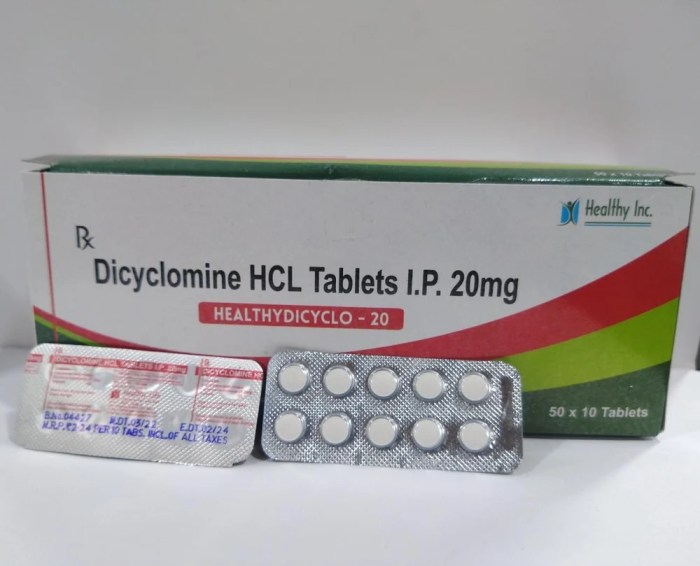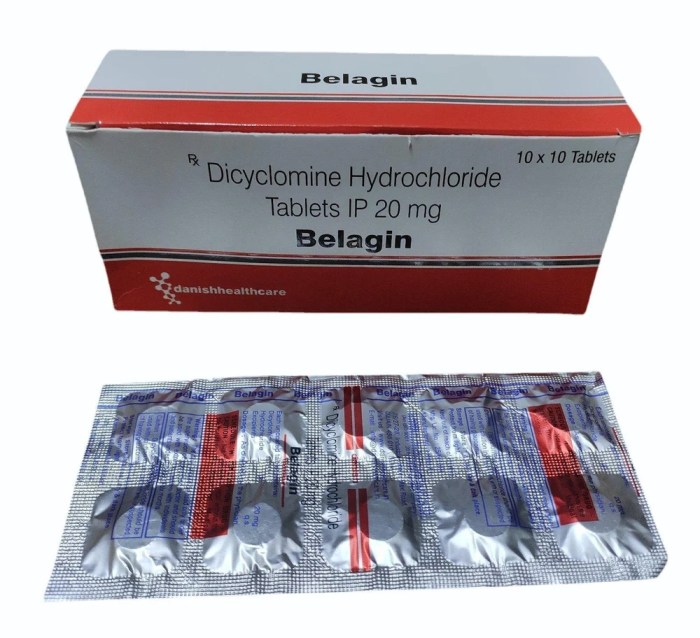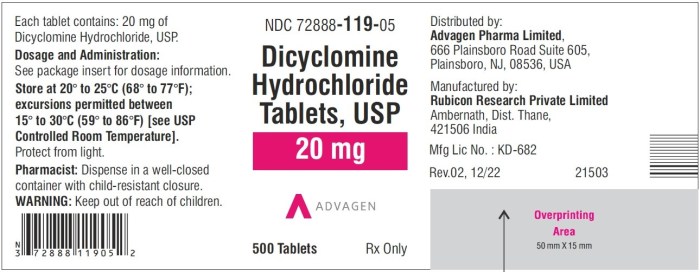Dicyclomine 20 mg, an anticholinergic medication, plays a crucial role in managing gastrointestinal disorders. It works by blocking the action of acetylcholine, a neurotransmitter that stimulates muscle contractions in the digestive tract. This mechanism helps to reduce muscle spasms and cramps, easing symptoms like abdominal pain, bloating, and diarrhea.
Dicyclomine is commonly prescribed for conditions such as irritable bowel syndrome (IBS) and functional dyspepsia. It can also be used to treat other gastrointestinal issues, including peptic ulcer disease and biliary colic. However, like any medication, dicyclomine comes with potential side effects and precautions. It’s essential to consult with a healthcare professional to determine if dicyclomine 20 mg is right for you and to understand the potential risks and benefits.
Dicyclomine
Dicyclomine is a medication that belongs to a class of drugs known as anticholinergics. It works by blocking the action of acetylcholine, a neurotransmitter that plays a crucial role in muscle contractions, including those in the gastrointestinal tract.
Mechanism of Action, Dicyclomine 20 mg
Dicyclomine exerts its therapeutic effects by inhibiting the action of acetylcholine at muscarinic receptors, which are located on smooth muscle cells throughout the body, including the gastrointestinal tract. When acetylcholine binds to these receptors, it triggers muscle contractions. However, dicyclomine blocks this binding, preventing acetylcholine from activating the receptors and effectively reducing muscle spasms.
Therapeutic Indications
Dicyclomine is primarily indicated for the treatment of gastrointestinal disorders characterized by excessive muscle contractions, such as:
- Irritable bowel syndrome (IBS): Dicyclomine helps to relieve abdominal pain, cramping, and bloating associated with IBS.
- Functional dyspepsia: It can alleviate symptoms such as heartburn, nausea, and fullness after meals.
- Other gastrointestinal disorders: Dicyclomine may also be used to treat other conditions, such as biliary colic, spastic colon, and diverticulitis.
Pharmacokinetics of Dicyclomine: Dicyclomine 20 Mg
Dicyclomine is an anticholinergic medication used to treat a variety of gastrointestinal disorders, including irritable bowel syndrome (IBS) and functional dyspepsia. Understanding its pharmacokinetic profile is crucial for optimizing its therapeutic use and minimizing potential adverse effects.
Absorption
Dicyclomine is readily absorbed from the gastrointestinal tract following oral administration. The bioavailability of dicyclomine is estimated to be around 50%, meaning that approximately half of the ingested dose reaches systemic circulation.
Distribution
Once absorbed, dicyclomine is widely distributed throughout the body, crossing the blood-brain barrier and reaching various tissues and organs. Its distribution is influenced by its high lipid solubility, allowing it to readily penetrate cell membranes.
Metabolism
Dicyclomine undergoes extensive hepatic metabolism, primarily by the cytochrome P450 enzyme system. The primary metabolic pathway involves hydroxylation and demethylation, leading to the formation of inactive metabolites.
Excretion
The majority of dicyclomine and its metabolites are eliminated from the body through the urine, with a smaller proportion excreted in the feces. The elimination half-life of dicyclomine is approximately 4-6 hours, indicating that its effects persist for several hours after administration.
Half-life
The elimination half-life of dicyclomine is approximately 4-6 hours, indicating that its effects persist for several hours after administration. This relatively short half-life suggests that multiple doses per day may be necessary to maintain therapeutic levels.
Drug Interactions
Dicyclomine can interact with other medications, particularly those that are metabolized by the same enzymes or that have anticholinergic properties.
For instance, concurrent use of dicyclomine with other anticholinergics, such as atropine or scopolamine, may increase the risk of anticholinergic side effects, such as dry mouth, blurred vision, constipation, and urinary retention.
Factors Influencing Pharmacokinetics
Several factors can influence the pharmacokinetics of dicyclomine, potentially altering its absorption, distribution, metabolism, and excretion.
Age
Older adults may experience slower drug metabolism and elimination, leading to increased drug accumulation and potential for adverse effects.
Hepatic Function
Patients with impaired hepatic function may have reduced drug metabolism, resulting in higher drug levels and prolonged drug effects.
Renal Function
Individuals with impaired renal function may have reduced drug excretion, leading to drug accumulation and potential for toxicity.
Therapeutic Uses of Dicyclomine 20 mg

Dicyclomine 20 mg is a medication primarily used to treat certain gastrointestinal disorders. It belongs to a class of drugs known as anticholinergics, which work by blocking the action of acetylcholine, a neurotransmitter that stimulates muscle contractions in the digestive system. This blocking action helps to relax the muscles in the stomach and intestines, reducing spasms and cramps.
Irritable Bowel Syndrome (IBS)
Dicyclomine 20 mg is often prescribed to manage the symptoms of irritable bowel syndrome (IBS), a common disorder that affects the large intestine. IBS is characterized by abdominal pain, bloating, gas, diarrhea, and constipation.
Dicyclomine 20 mg can help alleviate these symptoms by reducing muscle spasms in the colon, which can contribute to pain and discomfort. However, it’s important to note that dicyclomine 20 mg does not cure IBS and is typically used to manage symptoms on a short-term basis.
Functional Dyspepsia
Dicyclomine 20 mg can also be used to treat functional dyspepsia, a condition characterized by persistent or recurring upper abdominal pain or discomfort that is not caused by any underlying disease.
Dicyclomine 20 mg can help relieve symptoms of functional dyspepsia by reducing muscle spasms in the stomach, which can contribute to pain and bloating. It can also help improve the rate at which food empties from the stomach, which can reduce the feeling of fullness and discomfort.
Dosage and Frequency
The dosage and frequency of dicyclomine 20 mg administration vary depending on the individual’s condition and response to treatment. The typical dosage for adults is 20 mg taken three to four times daily, but it can be adjusted as needed.
For example, if a patient is experiencing severe symptoms, the dosage may be increased to 40 mg taken three to four times daily.
Benefits of Dicyclomine 20 mg
Dicyclomine 20 mg can provide several benefits for patients with gastrointestinal disorders:
- Reduced abdominal pain and discomfort: By relaxing the muscles in the stomach and intestines, dicyclomine 20 mg can help alleviate pain and cramps associated with IBS and functional dyspepsia.
- Improved bowel function: Dicyclomine 20 mg can help regulate bowel movements by reducing muscle spasms in the colon, which can contribute to constipation or diarrhea.
- Increased quality of life: By alleviating gastrointestinal symptoms, dicyclomine 20 mg can improve the quality of life for patients with IBS and functional dyspepsia.
Drug Interactions

Dicyclomine can interact with other medications, potentially leading to adverse effects. It’s crucial to inform your healthcare provider about all medications and supplements you’re taking before starting dicyclomine. This includes prescription and over-the-counter drugs, herbal remedies, and vitamins.
Interactions with Central Nervous System Medications
Dicyclomine can enhance the effects of central nervous system depressants, such as benzodiazepines, barbiturates, and alcohol. These interactions can lead to increased sedation, drowsiness, dizziness, and impaired coordination.
- Benzodiazepines, such as diazepam (Valium) and alprazolam (Xanax), are commonly prescribed for anxiety and insomnia. When combined with dicyclomine, they can increase the risk of drowsiness, confusion, and impaired cognitive function.
- Barbiturates, such as phenobarbital, are used to treat seizures and insomnia. Their combination with dicyclomine can exacerbate sedation, respiratory depression, and even coma.
- Alcohol can potentiate the effects of dicyclomine, leading to increased drowsiness, dizziness, and impaired motor skills. It’s essential to avoid alcohol consumption while taking dicyclomine.
Alternative Treatments and Considerations
Dicyclomine 20 mg is often prescribed to manage symptoms of irritable bowel syndrome (IBS) and other gastrointestinal disorders. However, it’s essential to consider alternative treatment options and understand their effectiveness and potential side effects.
Lifestyle Modifications and Dietary Changes
Lifestyle modifications and dietary changes are often the first-line approach to managing IBS symptoms. These changes aim to identify and eliminate potential triggers that exacerbate symptoms.
Lifestyle Modifications
- Stress Management: Stress can significantly worsen IBS symptoms. Techniques such as yoga, meditation, and deep breathing exercises can help reduce stress levels.
- Regular Exercise: Regular physical activity promotes gut motility and can help regulate bowel movements.
- Adequate Sleep: Getting enough sleep is crucial for overall health and can help manage IBS symptoms.
Dietary Changes
- Food Diary: Keeping a food diary can help identify specific foods that trigger symptoms.
- Low-FODMAP Diet: The low-FODMAP diet restricts foods high in fermentable carbohydrates, which can worsen IBS symptoms.
- Fiber Management: Adjusting fiber intake can be beneficial. Some individuals may benefit from increasing fiber intake, while others may need to reduce it.
- Elimination Diet: An elimination diet involves removing common trigger foods for a period of time and then reintroducing them one at a time to identify culprits.
Alternative Medications
- Antidiarrheal Medications: Loperamide (Imodium) and diphenoxylate with atropine (Lomotil) are effective in managing diarrhea.
- Antispasmodic Medications: Hyoscyamine (Levsin) and scopolamine (Transderm Scop) are similar to dicyclomine but may have different side effect profiles.
- Probiotics: Probiotics are live bacteria that can help restore the balance of gut bacteria.
- Antidepressants: Certain antidepressants, such as tricyclic antidepressants (TCAs) and selective serotonin reuptake inhibitors (SSRIs), can be effective in managing IBS symptoms.
Comparison of Dicyclomine 20 mg with Alternative Treatments
- Effectiveness: Dicyclomine 20 mg can be effective in reducing abdominal pain and cramping, but it may not be as effective as lifestyle modifications or other medications for all individuals.
- Side Effects: Dicyclomine 20 mg can cause side effects such as dry mouth, blurred vision, constipation, and drowsiness. Alternative treatments may have different side effect profiles.
Individualized Treatment Plans and Monitoring
- Individualized Treatment Plans: The best treatment for IBS and other gastrointestinal disorders varies depending on the individual’s symptoms, medical history, and preferences.
- Regular Monitoring: Regular monitoring by a healthcare professional is essential to ensure that treatment is effective and to manage any potential side effects.
Clinical Studies and Research
Clinical research plays a vital role in understanding the efficacy and safety of medications like dicyclomine 20 mg. Numerous studies have been conducted to evaluate its effectiveness in treating gastrointestinal disorders and to explore its potential applications in other medical fields.
Key Findings of Recent Clinical Studies
Recent clinical studies have investigated the efficacy and safety of dicyclomine 20 mg in treating various gastrointestinal disorders, including irritable bowel syndrome (IBS), functional dyspepsia, and other conditions characterized by abdominal pain, cramping, and diarrhea. These studies have yielded valuable insights into the drug’s therapeutic potential and its impact on patient outcomes.
Efficacy in Irritable Bowel Syndrome
A meta-analysis of several randomized controlled trials (RCTs) evaluated the effectiveness of dicyclomine in managing IBS symptoms. The results indicated that dicyclomine was associated with significant improvements in abdominal pain, bloating, and diarrhea compared to placebo.
Safety Profile
While dicyclomine has been generally well-tolerated, some studies have reported adverse effects such as dry mouth, blurred vision, and constipation. The risk of these side effects may vary depending on the individual’s sensitivity and the dosage used.
Ongoing Research and Potential Applications
Ongoing research is exploring the potential of dicyclomine in treating other medical conditions beyond gastrointestinal disorders. For instance, some studies are investigating its potential role in managing urinary incontinence, Parkinson’s disease, and certain types of chronic pain.
Urinary Incontinence
Preclinical studies have shown that dicyclomine may have a role in reducing bladder muscle spasms, potentially aiding in the management of urinary incontinence. However, further clinical trials are needed to confirm its effectiveness and safety in this context.
Parkinson’s Disease
Research suggests that dicyclomine might have therapeutic potential in treating Parkinson’s disease symptoms, particularly those related to muscle rigidity and tremors. The underlying mechanism is thought to involve its anticholinergic properties, which may help to regulate muscle activity.
Chronic Pain
Some studies have explored the potential of dicyclomine in managing chronic pain conditions, such as fibromyalgia and neuropathic pain. The drug’s ability to modulate nerve signaling pathways may contribute to its analgesic effects.
Importance of Continued Research
Continued research is crucial to optimize the use of dicyclomine 20 mg and improve patient outcomes. Ongoing studies are focusing on:
* Determining the optimal dosage and treatment duration for different gastrointestinal disorders.
* Identifying specific patient populations who may benefit most from dicyclomine therapy.
* Developing novel formulations or delivery methods to enhance the drug’s efficacy and minimize side effects.
* Exploring the potential applications of dicyclomine in other medical fields.
Regulatory Information and Availability

Dicyclomine 20 mg is a prescription medication available in various countries, with its regulatory status and availability varying depending on the specific jurisdiction.
Regulatory Status and Availability
The regulatory status of dicyclomine 20 mg is determined by national drug regulatory agencies, which evaluate its safety, efficacy, and quality before granting approval for marketing. Here’s a breakdown of its availability in different regions:
- United States: Dicyclomine 20 mg is available by prescription only. It is regulated by the Food and Drug Administration (FDA).
- European Union: Dicyclomine 20 mg is available in several European countries by prescription. The European Medicines Agency (EMA) oversees its regulatory approval and monitoring.
- Canada: Dicyclomine 20 mg is available by prescription in Canada, regulated by Health Canada.
- Australia: Dicyclomine 20 mg is available by prescription in Australia, regulated by the Therapeutic Goods Administration (TGA).
- Other Regions: The availability and regulatory status of dicyclomine 20 mg may vary in other regions depending on local regulations and healthcare systems.
Pricing and Availability in Different Markets
The price of dicyclomine 20 mg can vary significantly depending on factors such as the manufacturer, packaging size, and the specific market. It is generally available in pharmacies and online retailers, with prices often fluctuating due to market dynamics.
- United States: The price of dicyclomine 20 mg in the US can range from a few dollars to several tens of dollars per prescription, depending on factors like insurance coverage and pharmacy location.
- European Union: The price of dicyclomine 20 mg in the EU can vary across different countries, influenced by local healthcare systems and regulations.
- Canada: Dicyclomine 20 mg is typically available at a relatively affordable price in Canada due to its universal healthcare system.
- Australia: The price of dicyclomine 20 mg in Australia is generally comparable to other developed countries, with pricing influenced by factors such as the brand and pharmacy location.
Updates and Changes in Regulatory Guidelines
Regulatory guidelines regarding dicyclomine 20 mg are subject to change based on new scientific evidence, safety concerns, or evolving healthcare practices.
- FDA Safety Communications: The FDA may issue safety communications or warnings regarding dicyclomine 20 mg if new safety concerns arise.
- EMA Updates: The EMA regularly reviews and updates its guidelines for dicyclomine 20 mg based on ongoing research and monitoring.
- Local Regulations: Local regulatory agencies may implement changes or updates to their guidelines for dicyclomine 20 mg, which could affect its availability or usage in specific regions.
While dicyclomine 20 mg can be an effective treatment for certain gastrointestinal conditions, it’s important to remember that it’s not a cure-all. Understanding the potential side effects, drug interactions, and precautions is crucial for safe and effective use. Always discuss your medical history and any medications you’re taking with your healthcare provider before starting dicyclomine. They can help determine if it’s the right treatment for you and guide you on the best way to manage your condition.
Dicyclomine 20 mg is a medication used to treat irritable bowel syndrome (IBS) by reducing muscle spasms in the digestive tract. While dicyclomine focuses on the digestive system, a different kind of medication, like zometa , targets bone health and is used to treat conditions like osteoporosis. Both medications aim to alleviate discomfort and improve quality of life, but they work on different systems within the body.